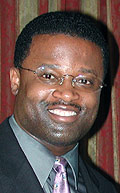 US GM Maurice Ashley has posted at TWIC a long and interesting argument in favor of regulating draw offers. This has been a hobby-horse of mine as well over the years, although I have been more in favor of publicly shaming Grandmasters who draw too early, too often. (I developed a formula called the Chicken Factor that, to my great surprise, not only seemed to be accurate but was well received by the chess community, if not the professional players.) I was even accused by several players of trying to ruin their careers by suggesting they shouldn't be invited to tournaments if they didn't want to play chess. Ashley suggests prohibiting draw offers until after move 50.
US GM Maurice Ashley has posted at TWIC a long and interesting argument in favor of regulating draw offers. This has been a hobby-horse of mine as well over the years, although I have been more in favor of publicly shaming Grandmasters who draw too early, too often. (I developed a formula called the Chicken Factor that, to my great surprise, not only seemed to be accurate but was well received by the chess community, if not the professional players.) I was even accused by several players of trying to ruin their careers by suggesting they shouldn't be invited to tournaments if they didn't want to play chess. Ashley suggests prohibiting draw offers until after move 50.
Similar projects have been tried in the past, once at Fischer's insistence when his Soviet opponents made too many short draws amongst themselves. (Fischer famously flouted his own rule by playing a <30 move draw soon afterwards and answered the obvious questions with, "That rule is for commie cheaters, not for me!") Anything to help prevent the disasters Ashley describes (final round of this year's US Championship and the sixth game of the Kasparov-Junior match) is very welcome.
There are practical difficulties by the bunches, of course. Ashley mentions the rarity of short perpetual checks (short, sharp forced repetitions like Alekhine-Botvinnik, Nottingham, 1936 were also a problem for the Chicken Factor). But the problem are all move repetition draws, whether check is involved or not. Players could make a mockery of a rule by just repeating moves thirty times to fill the scoresheet. (Xiangqi, Chinese chess, has complicated rules that can force one side to break off repetitions and perpetual checks. Shogi also has rules like this. I don't see why they couldn't be applied to chess.)
I agree with Ashley that it's a generational thing. If today's young players are brought up with not being able to offer a draw before move 50, they aren't going to worry about coming up with bizarre ways to circumvent the rule. Today's professionals, on the other hand, we can expect to prearrange draws more than ever if the early draw offer is disallowed. They are just too used to playing the occasional non-game, and these non-games are ruining the sport.
He doesn't mention some of the old methods for handling drawn games. In many 19th century tournaments, up until 1867, drawn games were replayed immediately until somebody won. (I believe this is current practice with shogi matches.) Colors were reversed, so you really tried hard to win with white because you had black next if you drew. Of course few games were drawn back then; today's pros are much more consistent and they would be there all night. Another method I remember reading about is simply turning the board around when a draw is agreed and continuing play with the colors reversed!
